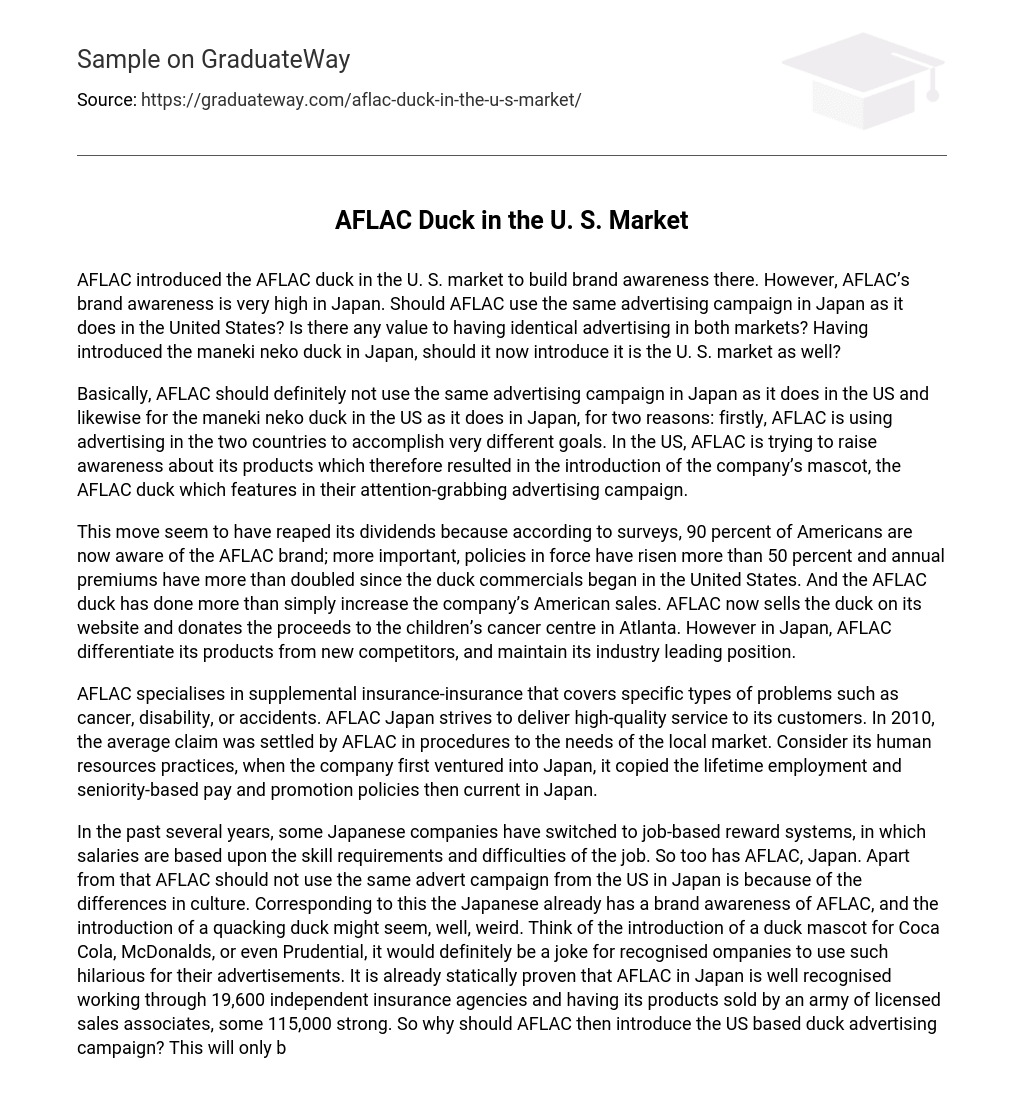AFLAC introduced the AFLAC duck in the U. S. market to build brand awareness there. However, AFLAC’s brand awareness is very high in Japan. Should AFLAC use the same advertising campaign in Japan as it does in the United States? Is there any value to having identical advertising in both markets? Having introduced the maneki neko duck in Japan, should it now introduce it is the U. S. market as well?
Basically, AFLAC should definitely not use the same advertising campaign in Japan as it does in the US and likewise for the maneki neko duck in the US as it does in Japan, for two reasons: firstly, AFLAC is using advertising in the two countries to accomplish very different goals. In the US, AFLAC is trying to raise awareness about its products which therefore resulted in the introduction of the company’s mascot, the AFLAC duck which features in their attention-grabbing advertising campaign.
This move seem to have reaped its dividends because according to surveys, 90 percent of Americans are now aware of the AFLAC brand; more important, policies in force have risen more than 50 percent and annual premiums have more than doubled since the duck commercials began in the United States. And the AFLAC duck has done more than simply increase the company’s American sales. AFLAC now sells the duck on its website and donates the proceeds to the children’s cancer centre in Atlanta. However in Japan, AFLAC differentiate its products from new competitors, and maintain its industry leading position.
AFLAC specialises in supplemental insurance-insurance that covers specific types of problems such as cancer, disability, or accidents. AFLAC Japan strives to deliver high-quality service to its customers. In 2010, the average claim was settled by AFLAC in procedures to the needs of the local market. Consider its human resources practices, when the company first ventured into Japan, it copied the lifetime employment and seniority-based pay and promotion policies then current in Japan.
In the past several years, some Japanese companies have switched to job-based reward systems, in which salaries are based upon the skill requirements and difficulties of the job. So too has AFLAC, Japan. Apart from that AFLAC should not use the same advert campaign from the US in Japan is because of the differences in culture. Corresponding to this the Japanese already has a brand awareness of AFLAC, and the introduction of a quacking duck might seem, well, weird. Think of the introduction of a duck mascot for Coca Cola, McDonalds, or even Prudential, it would definitely be a joke for recognised ompanies to use such hilarious for their advertisements. It is already statically proven that AFLAC in Japan is well recognised working through 19,600 independent insurance agencies and having its products sold by an army of licensed sales associates, some 115,000 strong. So why should AFLAC then introduce the US based duck advertising campaign? This will only bring disrupt to the core values within the society. If we were to introduce the same advertising campaign in Japan, it will cause cultural shock to the local people whether in education or in time.
Age plays a role too in this situation. Since Japan is a fast developing country with the statistic of older people ratio more than the younger, it is then a wise choice to then pick a mature advertising technique rather than going for a young and lively advertisements for the older generations to grasp. Probably less than 50% of the older generation will get the real meaning of the advisement if it was to be portrayed in such a way. Another thing is that some campaigns will create conflict with the culture of a particular place.
Take Japan and the US for an example, people in the use lives a carefree life and they can freely express their opinions whenever and wherever they wants whereas in Japan, women has sort of lesser power compared to the men. They are bound to listen to men and they regard men as higher authority peoples. So if we were to make an advertisement in Japan showing that the men is under the power of women authority, it will definitely cause a havoc and stir within the community of that place.





